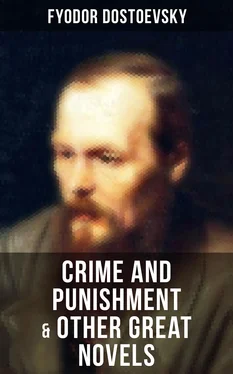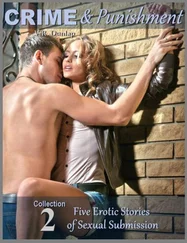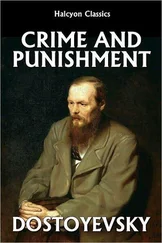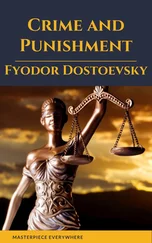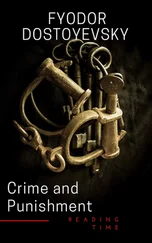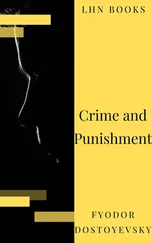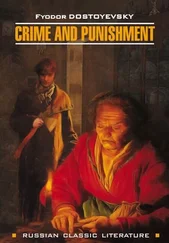“Let me be! I don’t want to!” Raskolnikov waved him off. He had listened with disgust to Razumihin’s efforts to be playful about his purchases.
“Come, brother, don’t tell me I’ve been trudging around for nothing,” Razumihin insisted. “Nastasya, don’t be bashful, but help me — that’s it,” and in spite of Raskolnikov’s resistance he changed his linen. The latter sank back on the pillows and for a minute or two said nothing.
“It will be long before I get rid of them,” he thought. “What money was all that bought with?” he asked at last, gazing at the wall.
“Money? Why, your own, what the messenger brought from Vahrushin, your mother sent it. Have you forgotten that, too?”
“I remember now,” said Raskolnikov after a long, sullen silence. Razumihin looked at him, frowning and uneasy.
The door opened and a tall, stout man whose appearance seemed familiar to Raskolnikov came in.
Table of Contents
Zossimov was a tall, fat man with a puffy, colourless, clean-shaven face and straight flaxen hair. He wore spectacles, and a big gold ring on his fat finger. He was twenty-seven. He had on a light grey fashionable loose coat, light summer trousers, and everything about him loose, fashionable and spick and span; his linen was irreproachable, his watch-chain was massive. In manner he was slow and, as it were, nonchalant, and at the same time studiously free and easy; he made efforts to conceal his self-importance, but it was apparent at every instant. All his acquaintances found him tedious, but said he was clever at his work.
“I’ve been to you twice to-day, brother. You see, he’s come to himself,” cried Razumihin.
“I see, I see; and how do we feel now, eh?” said Zossimov to Raskolnikov, watching him carefully and, sitting down at the foot of the sofa, he settled himself as comfortably as he could.
“He is still depressed,” Razumihin went on. “We’ve just changed his linen and he almost cried.”
“That’s very natural; you might have put it off if he did not wish it. . . . His pulse is first-rate. Is your head still aching, eh?”
“I am well, I am perfectly well!” Raskolnikov declared positively and irritably. He raised himself on the sofa and looked at them with glittering eyes, but sank back on to the pillow at once and turned to the wall. Zossimov watched him intently.
“Very good. . . . Going on all right,” he said lazily. “Has he eaten anything?”
They told him, and asked what he might have.
“He may have anything . . . soup, tea . . . mushrooms and cucumbers, of course, you must not give him; he’d better not have meat either, and . . . but no need to tell you that!” Razumihin and he looked at each other. “No more medicine or anything. I’ll look at him again to-morrow. Perhaps, to-day even . . . but never mind . . .”
“To-morrow evening I shall take him for a walk,” said Razumihin. “We are going to the Yusupov garden and then to the Palais de Crystal.”
“I would not disturb him to-morrow at all, but I don’t know . . . a little, maybe . . . but we’ll see.”
“Ach, what a nuisance! I’ve got a house-warming party to-night; it’s only a step from here. Couldn’t he come? He could lie on the sofa. You are coming?” Razumihin said to Zossimov. “Don’t forget, you promised.”
“All right, only rather later. What are you going to do?”
“Oh, nothing — tea, vodka, herrings. There will be a pie . . . just our friends.”
“And who?”
“All neighbours here, almost all new friends, except my old uncle, and he is new too — he only arrived in Petersburg yesterday to see to some business of his. We meet once in five years.”
“What is he?”
“He’s been stagnating all his life as a district postmaster; gets a little pension. He is sixty-five — not worth talking about. . . . But I am fond of him. Porfiry Petrovitch, the head of the Investigation Department here . . . But you know him.”
“Is he a relation of yours, too?”
“A very distant one. But why are you scowling? Because you quarrelled once, won’t you come then?”
“I don’t care a damn for him.”
“So much the better. Well, there will be some students, a teacher, a government clerk, a musician, an officer and Zametov.”
“Do tell me, please, what you or he”— Zossimov nodded at Raskolnikov — “can have in common with this Zametov?”
“Oh, you particular gentleman! Principles! You are worked by principles, as it were by springs; you won’t venture to turn round on your own account. If a man is a nice fellow, that’s the only principle I go upon. Zametov is a delightful person.”
“Though he does take bribes.”
“Well, he does! and what of it? I don’t care if he does take bribes,” Razumihin cried with unnatural irritability. “I don’t praise him for taking bribes. I only say he is a nice man in his own way! But if one looks at men in all ways — are there many good ones left? Why, I am sure I shouldn’t be worth a baked onion myself . . . perhaps with you thrown in.”
“That’s too little; I’d give two for you.”
“And I wouldn’t give more than one for you. No more of your jokes! Zametov is no more than a boy. I can pull his hair and one must draw him not repel him. You’ll never improve a man by repelling him, especially a boy. One has to be twice as careful with a boy. Oh, you progressive dullards! You don’t understand. You harm yourselves running another man down . . . . But if you want to know, we really have something in common.”
“I should like to know what.”
“Why, it’s all about a house-painter. . . . We are getting him out of a mess! Though indeed there’s nothing to fear now. The matter is absolutely self-evident. We only put on steam.”
“A painter?”
“Why, haven’t I told you about it? I only told you the beginning then about the murder of the old pawnbroker-woman. Well, the painter is mixed up in it . . .”
“Oh, I heard about that murder before and was rather interested in it . . . partly . . . for one reason. . . . I read about it in the papers, too . . . .”
“Lizaveta was murdered, too,” Nastasya blurted out, suddenly addressing Raskolnikov. She remained in the room all the time, standing by the door listening.
“Lizaveta,” murmured Raskolnikov hardly audibly.
“Lizaveta, who sold old clothes. Didn’t you know her? She used to come here. She mended a shirt for you, too.”
Raskolnikov turned to the wall where in the dirty, yellow paper he picked out one clumsy, white flower with brown lines on it and began examining how many petals there were in it, how many scallops in the petals and how many lines on them. He felt his arms and legs as lifeless as though they had been cut off. He did not attempt to move, but stared obstinately at the flower.
“But what about the painter?” Zossimov interrupted Nastasya’s chatter with marked displeasure. She sighed and was silent.
Читать дальше
